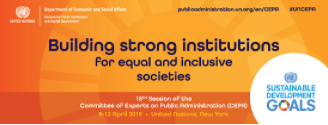
The Committee of Experts on Public Administration held its eighteenth session at the United Nations in New York from 8 to 12 April 2019 with the overall theme of “Building strong institutions for equal and inclusive societies”.
A key message of the session was that building equal and inclusive societies and leaving no one behind requires addressing the deep inequalities that exist in many countries. This in turn may require institutions at all levels to play a greater role in promoting and enforcing non-discriminatory laws and policies.
The Committee also emphasized the critical role of institutions in achieving all of the SDGs and examined progress, identified prospects and recommended actions for advancing implementation of institutional aspects of SDG 16 at the national and subnational levels. It was recognized that in-depth reviews of this Goal could be strengthened by stronger evidence of governance capacities and analysis of trends in many areas, taking into account important linkages between SDG 16 and all SDGs. Azerbaijan, Chile, Croatia, Côte d’Ivoire, Dominican Republic, Ecuador, Guatemala, Iceland, Indonesia, Liechtenstein and Uruguay made presentations on various institutional challenges and solutions as part of an interactive dialogue with the experts.
The Committee also revisited the principles of effective governance for sustainable development with a view to their operationalization. This would entail further work on elaboration of commonly used strategies, as well as collecting further evidence of what works and does not work and under which circumstances. It would call for engagement of experts and all relevant stakeholders, as well as linking the principles with work on governance indicators with a view to contributing to strengthening the analytical basis for assessing the impact of reform policies.
The Committee underlined that peaceful and inclusive societies and effective and accountable institutions of justice are associated with the legal empowerment of the poor as well as the non-linear and process-oriented approaches to security sector reform and peacebuilding. These approaches are more effective in solving the root causes of conflict, ensuring inclusive transitional justice and upholding rule of law in the long-run and through meaningful engagement of all sectors of society, including particularly women and vulnerable groups.
The Committee further underlined that enhancing the capacity of the public sector in core functional areas of administration requires new capacities and skills to effectively implement the SDGs, while traditional public sector competencies remain relevant. The Committee pointed to the enabling role that critical, complexity, futures and design thinking in addition to deliberative skills and emotional intelligence and appropriate use of frontier technologies, can play in delivering innovative public services and achieving the SDGs.
The Committee recalled that strengthening fiscal management at the national and subnational levels is integral to implementation of the SDGs and highlighted that sound fiscal management entails full ownership of domestic flows, reduction of illicit financial flows and corruption, strengthened fiscal transparency through open and collaborative budgeting processes, participatory and performance-based budgeting, and fiscal decentralization commensurate with subnational institutional capacity and arrangements in a given country.
The Committee adopted a draft resolution and a draft decision for the consideration of the Economic and Social Council. The Committee also prepared a contribution to the 2019 high-level political forum on the governance and public administration aspects of empowering people and ensuring inclusiveness and equality.
Read more (URL : https://publicadministration.un.org/en/CEPA/Session18)
 Welcome to the United Nations
Welcome to the United Nations